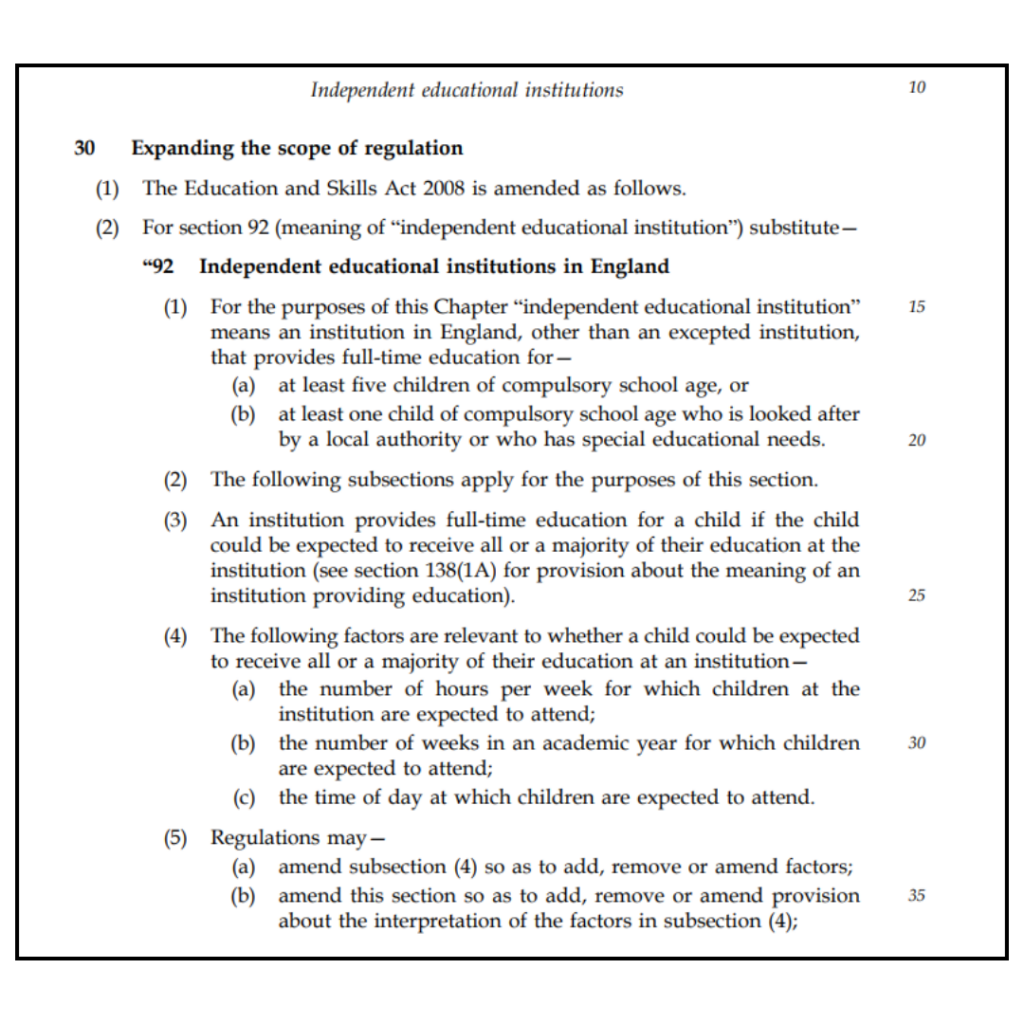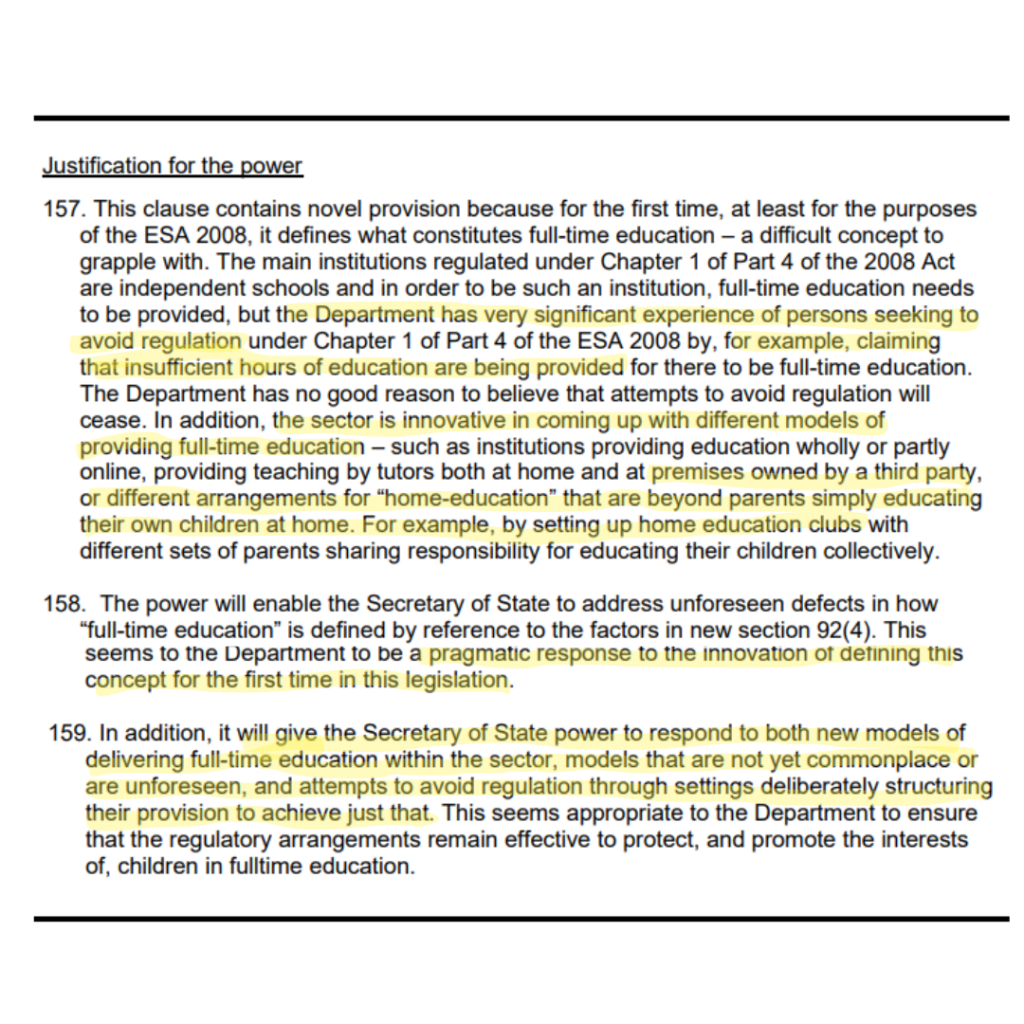Children’s Wellbeing and Schools Bill
The Children’s Wellbeing and Schools Bill was announced on 17th December 2024. There will be direct implications for people (in England and Wales) within the Progressive Education community, including progressive schools, flexi-schoolers, home educating families, and those who are striving to create something different to mainstream education via innovative part-time learning communities (despite the Government’s Impact Assessment stating the impact as minimal).
While we are supportive of the aims behind the Bill relating to keeping children and young people safe, there are parts of the Bill which are not in the best interests of the child and must be challenged.

Home Education Learning Communities
Learning communities are urged to read all the documents (not just the Bill itself), including the ‘Explanatory Notes’ and the ‘Delegated Powers Memorandum’. The Bill alone does not make it obvious how part-time learning communities are affected! Here are some of the main points we have pulled out…
- Definition of an ‘Independent Educational Institution’ (See Clause 30 of the Bill, plus the ‘Explanatory Notes’ from point 283):

- The definition of ‘full-time education’ and ‘majority’ will be set out ‘by regulation’. This means that it will be decided upon and added in later – after this Bill has already become law – by the Secretary of State for Education, without input from the public or MPs. See Bill Clause 30 and ‘Explanatory Notes’ point 285:
“The meaning of full-time education is set out in new subsection (3) in section 92 of the 2008 Act. This establishes that an institution provides full-time education for a child if the child could be expected to receive all or a majority of their education at the institution. New subsection (4) sets out the factors that must be taken into account when determining whether a setting could be expected to provide all or a majority of a child’s education (such as the number of hours per week children are expected to attend) and new subsection (5) provides a regulation-making power to, amongst other things, add to, or remove factors from, subsection (4) and to make provision about how the factors are to be taken into account. This regulation-making power is subject to the affirmative resolution procedure because of an amendment made to section 166(2) of the 2008 Act by clause 30(9).”
This means that even a learning community which currently operates on a part-time basis could actually end up being considered ‘full-time’ or taking up ‘the majority’ of a young person’s education (in the same way a university course which only runs for a few hours a week can be considered full-time). They would therefore need to register (and be inspected) as an ‘Independent Educational Institution (IEI)’, by the same criteria as independent schools.
The Bill also states that a provider would be classed as an IEI if it provides “instruction or guidance on any matter (and for this purpose it does not matter whether, or by whom, students attending the institution are supervised),” so the IEI classification would also extend to home-ed co-ops where parents/carers stay, if they operate for the yet-to-be-defined number of hours, or more. [Bill clause 31, section 8 b (1A)]
These extracts from the ‘Delegated Powers Memorandum’ (points 157, 158 and 159), show how the Government would ideally like to regulate home education learning communities:

- Independent Educational Institutions to be inspected against standards or face closure. See ‘Explanatory Notes’ point 290:
“Clause 31, amongst other things, amends section 94 of the 2008 Act. Section 94 defines the standards, which proprietors of independent educational institutions must comply with and against which these institutions are inspected. Independent educational institutions which do not meet the standards may face regulatory action, up to and including de-registration.”
Home Education
- A new register for all children not in school, to include contact details of all educators – including tutors, websites, learning communities etc – and the exact number of hours per week with each parent, and any other person involved with ‘out of school education’ for the child. Any changes to be reported to the Local Authority (LA) within 15 days. [Bill clause 25, section 436B-D]
This would result in an unrealistic amount of admin for parents/carers, as well as for the additional educators (which could include personnel in the library, museums, on trips; neighbours; extended family; friends etc) who would then, in turn, be required to report back to the LA as well.
- Group leaders/facilitators ‘without parental supervision’ to be required to report to the LA when they have home educated children taking part (Scouts, music classes, sports groups, clubs, etc.). This could lead to exclusion of home educated young people altogether if groups don’t have resources for extra admin. [Bill clause 25, section 436E];
- Increased LA oversight, meaning the LA (without training in alternatives to conventional schooling, child development or SEND) would be required to assess the suitability of the home education;
- LAs can ask home educators for home visits and must consider a refusal as part of their assessment, therefore potentially noting this as an indication of unsuitable education.
- An LA (at their discretion) may deem that pedagogy that does not follow the National Curriculum (NC) is unsuitable or that it does not count towards ‘education’. This could result in either the family changing their approach to avoid prosecution, or proving in a court the suitability of their alternative to the NC;
- School Attendance Orders’ (SAOs) could be sent to families who do not follow a conventional education approach. If breached SAOs can result in fines or imprisonment.
- Opportunities for personalising the learning to the young person will be limited, should the LA not find an autonomous/interest-led learning style to be ‘suitable’;
Flexi-Schooling
- Flexi-schooled children and young people have been included in the Bill’s proposed register and suggests a fundamental misunderstanding of how flexi-schooling operates. It indicates an underestimation of the systems of checks and balances that school leaders already have in place to ensure that children are safe.
- Flexi-schooling learners are already registered at school (which retains full funding per
child) in the normal way, and their flexi-schooling days are not classified as ‘elective home education’. They are receiving a ‘suitable education’, considered and agreed by their schools’ head teacher, in line with schools’ responsibilities for the ‘performance’ of flexi-schooled pupils.
- The inclusion of flexi-schoolers in LA registers (points 436 and 436C) wrongly assumes insufficient oversight by schools. Head teachers are already monitoring these arrangements and should have documented policies, contracts, and review processes in place. Requiring parents/carers to submit additional reports to local authorities, for flexi-schoolers, who are already registered at school, would create unintended consequence through an unworkable and unnecessary administrative burden.
Academies
- Academies will be forced to follow the National Curriculum, reducing creativity and innovation (this has disappointingly been proposed prior to the completion of the Curriculum & Assessment Review) [Bill clause 41];
Special Schools
- The LA “must” refuse deregistration from a special school if they decide it is not in the best interests of the child (potentially omitting child/parent/carer perspective);
Get Involved and Take Action
This Bill appears to be passing through quickly without proper scrutiny, so please get involved today, to express your concerns and query any areas that need clarifying. There are three things we can do right now… Please do continue to liaise with your MP, in order to challenge the direction of this concerning advancement in education law. Please also reach out to members of the House of Lords, as the Bill is due to have its second reading in the House of Lords after the Easter recess. There are tips on how to do this below. Finally, add your name to the new open letter…
Sign the Open Letter!
Please take a couple of minutes to sign this open letter, to ask the Secretary of State for Education (England) and the Secretary of State for Education (Wales) to withdraw clauses from the Children’s Wellbeing and Schools Bill that do not reflect a free and democratic society.
Write to Your MP:
STEP 1: Find the contact details of your local MP
You can find your MP here: https://members.parliament.uk/members/commons
STEP 2: Draft your letter
You can use one of our templates if you wish. Please edit as appropriate, and add as many personalised details as possible, as it is much more effective to use your own words than duplicated templates. Personal stories will have the most impact!
<Download MP Letter Template – Learning Communities>
<Download MP Letter Template – Home Educators>
STEP 3: Email and/or post it to your MP ASAP!
Do both if you can as some people find that letters get a higher response.
STEP 4: Request a meeting
If you also feel able to ask for a meeting with your MP to discuss your concerns, this can be highly impactful. You could do this as an individual or in a group.
STEP 5: Log your response
If you receive a response from your MP (and you are a home educator), please take two minutes to complete this form – on behalf of the Home Education Action Group – indicating how supportive they were of elective home education.
How to Contact Members of the House of Lords:
The HE Byte has put together this page to support you in contacting members of the House of Lords.
Good luck! Please do keep in touch and let us know how you get on.
Further Resources
Educational Freedom:
- This new section of their site, which is dedicated to the Bill, includes another letter template, should you need it.
- They are also running helpful webinars, like this one from 4th January.
- Their update on 10th January offers more info about the 2nd reading of the Bill in Parliament, where you can find out what your own MP might have said, and how to respond to it. Further down the page, you can find a list of the sections of the Bill which need removing or rewording, which you could include in your letter.
We Are Home Educators UK:
- This new home education campaigning group launched in January 2025, with the aim of “breaking down stereotypes around this empowering, child-led approach to education and family life”.
- They are putting out some useful resources including this 13 minute video, which sums up the main problems of the Bill succinctly.
- They are also sharing tips for writing to your MP, and make the reassuring point that, “your letter doesn’t need to be perfect, or long. Just say something!”
HE Byte:
The HE Byte posts short articles summarising recent news and events relating to home education. You can read their updates on the Bill here.
Home Education Action Group:
This Facebook group was set up to coordinate actions to fight the current attacks on Elective Home Education in the UK. They are sharing lots of using info about the Bill and have been an invaluable support in putting this page together and running our recent webinar.
Ed Yourself:
This blog gives some info about the timeline of the Bill. And there is more information on their website.
Education Otherwise:
Education Otherwise is sharing information via their website and Facebook Group and are running webinars too, like this one.
Progressive Education:
Finally, you can find lots of resources about home education generally – blogs, books, groups, more websites etc – on our Home Education page.

